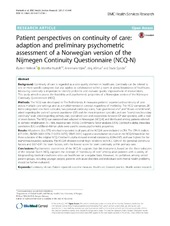Patient perspectives on continuity of care: Adaption and preliminary psychometric assessment of a Norwegian version of the Nijmegen Continuity Questionnaire (NCQ-N)
Peer reviewed, Journal article
Published version

Åpne
Permanent lenke
https://hdl.handle.net/1956/18104Utgivelsesdato
2017-11-21Metadata
Vis full innførselSamlinger
Originalversjon
https://doi.org/10.1186/s12913-017-2706-1Sammendrag
Background: Continuity of care is regarded as a core quality element in healthcare. Continuity can be related to one or more specific caregivers but also applies to collaboration within a team or across boundaries of healthcare. Measuring continuity is important to identify problems and evaluate quality improvement of interventions. This study aimed to assess the feasibility and psychometric properties of a Norwegian version of the Nijmegen Continuity Questionnaire (NCQ). Methods: The NCQ was developed in The Netherlands. It measures patients’ experienced continuity of care across multiple care settings and as a multidimensional concept regardless of morbidity. The NCQ comprises 28 items categorised into three subscales; two personal continuity scales, “care giver knows me” and “shows commitment”, asked regarding the patient’s general practitioner (GP) and the most important specialist; and one “team/cross boundary continuity” scale, asked regarding primary care, specialised care and cooperation between GP and specialist, with a total of seven factors. The NCQ was translated and adapted to Norwegian (NCQ-N) and distributed among patients referred to somatic rehabilitation (N = 984, response rate 34.5%). Confirmatory factor analyses (CFA), Cronbach’s alpha, intra-class correlation (ICC) and Bland–Altman plots were used to assess psychometric properties. Results: All patients (N = 375) who had responded to all parts of the NCQ-N were included in CFA. The CFA fit indices (CFI 0.941, RMSEA 0.064 (95% CI 0.059–0.070), SRMR 0.041) support a seven-factor structure in the NCQ-N based on the three subscales of the original NCQ. Cronbach’s alpha showed internal consistency (0.84–0.97), and was highest for the team/cross-boundary subscales. The NCQ-N showed overall high reliability with ICC 0.84–91 for personal continuity factors and 0.67–0.91 for team factors, with the lowest score for team continuity within primary care. Conclusions: Psychometric assessment of the NCQ-N supports that this instrument, based on the three subscales of the original Dutch NCQ, captures the concept of “continuity of care” among adult patients with a variety of longstanding medical conditions who use healthcare on a regular basis. However, its usefulness among varied patient groups, including younger people, patients with acute disorders and individuals with mental health problems, should be further evaluated.
